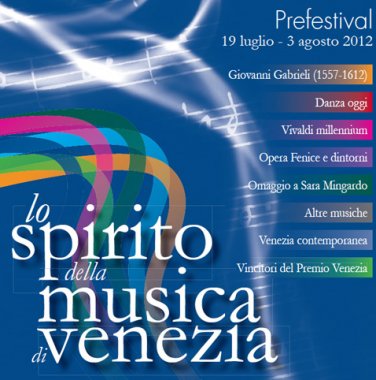In referring to the 'spirit of music' of Venice, the festival created and organized by the Fondazione Teatro La Fenice - which opens fully in 2013 - intends to represent a renewed attention to the extraordinary heritage of Venetian music, as a sound object history, and as a material offered to new and exciting ways performing, ready to become an incentive for new creations, exhibitions, performances, happenings. The festival, therefore, a Venetian mirror that rests on the specificity of his past to be open, 'sound', International Workshop, extending into the third millennium.
Between late July and early August 2012 starts the Prefestival, that illustrates the guidelines of the 'spirit of music' of Venice. All the musical life of Venice reflected in those centuries, the political situation. Nothing were closed to the court and ceremonial service owners: the doge and his entourage moved to the city in big spaces and the sight of the people. This politics, regarding Venetian music, has requested, encouraged, promoted music and more music, constantly updated styling, but continuously stimulated by the need to do the soundtrack to the civil and religious ceremony. A complex-spectacular celebration that becomes the model for all Europe and that encourages the presence of composers, singers and musicians ultramontane.
Among the many great names this year the focus is the centenary of the Venetian composer Giovanni Gabrieli (1557 - August 12, 1612). Thanks to the flourishing international market promoted from Venetian music publishing - the first in the sixteenth and seventeenth centuries in Europe - the fame of Gabrieli, globalized Europe. Seven appointments dedicated to Giovanni Gabrieli, in the fourth centenary of the death. In the churches of San Girolamo in Venice, San Moisè and San Donato in Murano, the Ensemble Oktoechos and Gregorian School of Venice, both directed by Lanfranco Menga, will perform a concert of Gregorian chant - the ancient monody of the Catholic liturgy - and the first experiences polyphonic four-sixteenth. An excursus through Spanish, Italian (especially Venetian) and English literature, of the sixteenth and eighteenth century, is the program of two concerts of the organist Antonio Frigé one in the Church of the Frari (July 25) and the other in the Cathedral of San Lorenzo of Mestre (29 July), with Spanish music of Correa de Arauxo, Bruna e Cabanilles, and Italian melodies of Andrea Gabrieli, Frescobaldi, Storace, Vivaldi e Lucchesi, and from the english side Händel e Stanley.
A highlight Vivaldi will be the focus of the concert proposed in the Basilica dei Frari (July 22) by Margherita Gianola and Silvio Celeghin with the Accademia di San Rocco, conducted by Francesco Fanna: concert for two organs, two violins and strings RV 584, written by Vivaldi in 1735 to inaugurate the second member of the Church of the Pietà and executable only in the Frari in Venice today, thanks to the two organs of the eighteenth century which Basilica is provided.
Last collaboration between La Fenice Theatre Foundation and Fondazione Bevilacqua La Masa, Fenix is the work of the choreographer of Geneva Foofwa Imobilité and artist Stefano Arienti, who will be overseeing the installations. The spirit of music is embodied also in the great interpreters. The prefestival paid homage to Sara Mingardo who was born in Venice and studied music, and still offers Opera in Fenice and a recital by Jessica Pratt, who won the public over the last month of the Teatro La Fenice, engaged in air by Mercadante, Rossini, Verdi and Donizetti operas.

